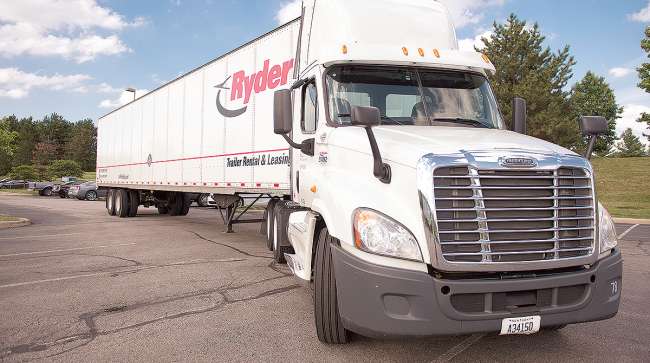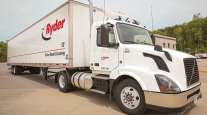Staff Reporter
Ryder Posts Record Revenue for 4Q, Full Year

A strong economy and demand for freight movement proved instrumental as Ryder System Inc. declared record revenue for its final 2018 quarter and the full year.
The Miami-based leasing and rental firm was lifted by customers new to outsourcing and an expansion of last-mile capabilities for big and bulky goods ordered via a growing e-commerce environment, according to Ryder officials.
Ryder reports record 2018 revenue of $8.4 billion, up 15%; strong contractual revenue growth drives 2019 earnings forecast. Read more here - https://t.co/STmUTaEAlz #RyderEarnings pic.twitter.com/F6wPp4lETx — Ryder (@RyderSystemInc) February 14, 2019
Ryder System is the parent of Ryder Supply Chain Solutions, which ranks No. 12 on the Transport Topics Top 100 list of the largest for-hire carriers in North America.
Ryder reported net income of $108.8 million in financial statements released Feb. 14. Earnings per share from continuing operations were $2.06 in the fourth quarter of 2018, down from $12.12 in the fourth quarter of 2017.
Company officials said the fourth quarter of 2017 included a net benefit from tax reform of $10.79 per share. Thus, comparable earnings per share from continuing operations were $1.82 in the fourth quarter of 2018 versus $1.37 in the year-earlier period.
Total revenue in the fourth quarter was $2.3 billion, up 17% from the same period in 2017. Operating revenue was $1.8 billion, up 13%.
Ryder reported 2018 profits of $273.3 million, or $5.21 per share. Record revenue of $8.4 billion was reported for all of 2018, up 15% according to officials, who said they expect 2019 earnings of $6.20 to $6.50 per share.

Sanchez
The yearly performance in earnings was driven by exceptionally strong rental performance, multiyear contractual revenue and fleet growth, according to CEO and Chairman Robert Sanchez.
“Our lease fleet grew by a record 9,600 vehicles, 40% higher than our previous record achieved in 2015,” Sanchez told investors on Ryder’s Feb. 14 conference call. “2018 is our seventh consecutive year of organic lease-fleet growth, with around 40% of new lease sales from customers who are new to outsourcing.”
Sanchez said that in 2018 Ryder generated its second consecutive year of record contractual sales growth, with an average lease contract term of six years.
Art Garcia, senior vice president and chief financial officer, told investors Ryder achieved double-digit revenue growth in the final quarter of 2018 because of this new business and higher volumes.
Garcia said the average fleet age was about 43 months for 2018, up from 41 months in 2017. Additions to the fleet may bring that average down to 40 in 2019, he said.
Sanchez said Ryder’s pilot program for shared trucks, known as Coop, was a success in Atlanta and may be tested in South Florida. Coop is the first business-to-business platform in which commercial motor vehicles can be shared when they are not being used by the company that owns the truck or trailer. The company rolled out the “Airbnb” program for idle or unused trucks April 1.
“We are very excited about the result of that initial pilot and then really a full rollout in Atlanta,” Sanchez said.
Given the Atlanta success, Ryder will test the program in South Florida, he said. Once Atlanta and South Florida are tested, Ryder will assess if the program will go wider or perhaps national, Sanchez said.
Ryder officials were asked by an analyst about the extreme weather in the first month of the year and how that could affect earnings.
“There is always a little bit of an impact from these unusual changes in temperature,” Sanchez said. “But no, I don’t see it as being a big impact in [2019]. Obviously, it’s a little bit more work for us as we have to respond to our customers as their trucks are down, but I don’t see that as a big impact.”
Generally, the economy has kept rentals over a week and longer-term leases going strong for Ryder, Sanchez said.
“I’d tell you rental and lease were both very strong in 2018, and we’ve seen that really continue into January and into February this year,” Sanchez told investors. “We had our strongest January this year. … So it goes to show you things haven’t really slowed down. …I’d say things have continued to look really strong, I think, indicative of the freight environment and it’s an overall healthy U.S. economy.”




